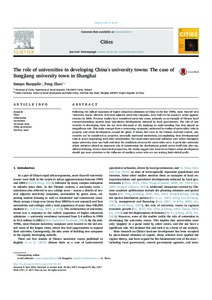The role of universities in developing China's university towns: The case of Songjiang university town in Shanghai
Sampo Ruoppila; Feng Zhao
https://urn.fi/URN:NBN:fi-fe2021042716994
Tiivistelmä
Following the radical expansion of higher education admission in China in the late 1990s, more than 60 new
‘university towns’, districts of several adjacent university campuses, were built in the country's urban agglom-
erations by 2006. Previous studies have considered university towns primarily as an example of Chinese local
entrepreneurialism, namely large speculative developments initiated by local governments. The role of uni-
versities in developing them has not been discussed at all, implying an understanding that they played an
insignificant role. This study emerges from a contrasting viewpoint, motivated by studies of universities' roles in
property and urban development around the globe. It shows that even in the Chinese state-led context, uni-
versities can be considered as proactive, internally motivated institutions, accomplishing their developmental
ends as actors negotiating with other stakeholders. The universities had some influence over where Shanghai's
major university town was built and what the conditions of access for universities were. A particular university
whose initiative played an important role in commencing the development gained access itself only after significant lobbying. From a theoretical perspective, the results suggest that research on China's urban development
should pay more attention to the influence of auxiliary actors who are not seeking land-related profit.
Kokoelmat
- Rinnakkaistallenteet [27094]
